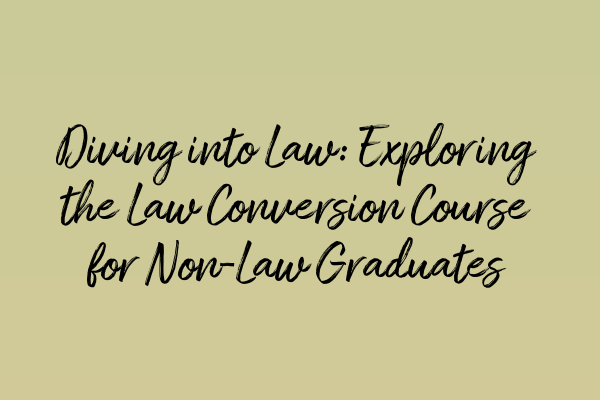Are you a non-law graduate considering a career in the legal profession? If so, you may be interested to know that there is a pathway available to you: the Law Conversion Course. This course is designed specifically for non-law graduates who wish to enter the legal profession. In this blog post, we will explore the Law Conversion Course, its benefits, and what it entails.
The Law Conversion Course: An Overview
The Law Conversion Course, also known as the Graduate Diploma in Law (GDL), is a one-year full-time or two-year part-time program that enables non-law graduates to qualify as solicitors or barristers. It provides a comprehensive foundation in law, covering the core subjects required for professional legal qualifications.
The GDL is recognized by the Solicitors Regulation Authority (SRA) and the Bar Standards Board (BSB) as a qualifying law degree. This means that upon successful completion of the GDL, non-law graduates can progress onto the Legal Practice Course (LPC) or the Bar Professional Training Course (BPTC), the next steps in the journey to becoming a solicitor or barrister, respectively.
The Benefits of the Law Conversion Course
1. Opens Up Exciting Career Opportunities
By undertaking the Law Conversion Course, you are broadening your career options significantly. Once you have completed the GDL, you can pursue a wide range of legal careers, including criminal law, family law, corporate law, and more. The legal profession offers diverse and intellectually stimulating work, making it an attractive choice for many.
2. Suitable for Non-Law Graduates
The Law Conversion Course is specifically designed for non-law graduates, meaning you do not need a law degree to enroll. This makes it a great option for individuals who have already completed a degree in another discipline but wish to transition into law.
3. Develops Essential Legal Skills
During the GDL, you will be equipped with fundamental legal knowledge and skills, such as legal research, analysis, and critical thinking. These skills are essential for success in the legal profession and are transferable to many other industries as well.
You may be wondering, what exactly will I study during the Law Conversion Course? Let’s take a closer look at the curriculum.
The Law Conversion Course Curriculum
The Law Conversion Course covers the core subjects required for professional legal qualifications. These subjects include:
- Contract Law
- Tort Law
- Constitutional Law
- Criminal Law
- Equity and Trusts
- Land Law
- European Union Law
In addition to these core subjects, some Law Conversion Courses also offer optional modules, allowing you to specialize in specific areas of law. Specializations could include commercial law, human rights law, or intellectual property law, among others. These optional modules provide an opportunity to tailor your studies towards your interests and career goals.
Next Steps: Beyond the Law Conversion Course
Upon successful completion of the Law Conversion Course, your journey towards becoming a solicitor or barrister is not over. The next steps are the Legal Practice Course (LPC) and the Bar Professional Training Course (BPTC), respectively.
The LPC is the final stage of training for solicitors and focuses on the practical skills required in practice. On the other hand, the BPTC is the vocational component of training for barristers and emphasizes advocacy, drafting, and legal research skills.
Both the LPC and the BPTC are highly competitive, so it’s essential to prepare yourself adequately. To enhance your chances of success, consider seeking additional resources, such as professional guidance and exam preparation courses.
In Conclusion
The Law Conversion Course opens up exciting career opportunities for non-law graduates. By undertaking this course, you can transition into the legal profession and pursue a fulfilling career in a wide range of legal areas. Whether you aspire to become a solicitor or barrister, the Law Conversion Course provides the necessary foundation for your journey. So, if you’re ready to dive into law, the Law Conversion Course might be the perfect choice for you.
If you want to learn more about the legal profession and related topics, check out our other articles:
- Private Prosecutions: Exploring Non-Governmental Prosecutions in Criminal Cases
- Ethical Challenges in Criminal Defence: Navigating Dilemmas
- Understanding Drug-related Offences: Laws and Penalties in the UK
- Magistrates’ Court vs Crown Court: Different Paths in Criminal Proceedings
- Criminal Defence Strategies: Expert Approaches to Protecting Clients’ Interests
We hope these additional articles will provide you with valuable insights into various aspects of the legal profession. Good luck on your journey to becoming a solicitor or barrister!


Leave a Reply